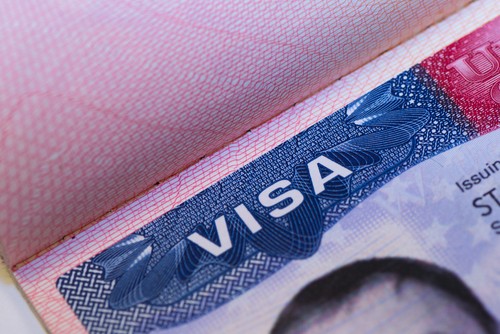Types of Visas
The United States has long opened its doors to many immigrants from all around the world, but though immigrants form part of the U.S.’s backbone, it is not easy to immigrate. Many visitors to the U.S. do not wish to immigrate, and there are legal alternatives for them to be able to stay in the U.S. for longer than a brief vacation. Read on to learn more about the documents that you will require in order to spend an extended stay in the U.S.
Download Our Free Immigration Guide
Non-Immigrant Visas Are the Key to Temporary Stays in the U.S.…
In the United States, a non-immigrant visa is required for anyone who wishes to stay in the country on a temporary basis, including for work, tourism, and medical reasons. A non-immigrant visa does not grant you permanent residency in the country, nor does it give you the right to vote or acquire a new job, but it does grant you a temporary stay in the United States. While the process can be simple for some, non-immigrant visas can give rise to many complications.
…But Receiving One Is Easier Said Than Done.
The regulations pertaining to non-immigrant visas are strict, and the United States is careful to grant them only to individuals and families who fall within the guidelines. To ensure that you receive a visa, you must be visiting the United States for one of the following reasons:
– Career (includes business owners, athletes and entertainers)
– Medical care
– Tourism
– Family (includes children, spouses, and fiancé(e)s of current U.S. citizens)
– Foreign exchange program
– Education.
Consular processing allows foreign nationals to apply for visas while still in their home country. This is best handled with an experienced immigration lawyer in the U.S. working closely with a liaison (usually a family member or employer) already in the country.
These Types of Visas Are Not Managed by USCIS.
Submitting a petition via consular processing presents its own challenges because the Department of State, and not the United States Customs and Immigration Services oversees these matters. Access to files can be limited and backlogs are common. Nevertheless, an attorney can ensure that the government has the requisite information to process your petition without unnecessary delays.
Student Visas Can Provide an Prospective Pathway to Citizenship.
If you wish to study in the United States but are not a citizen, you can obtain a student visa that will allow you to pursue an education in the country legally. This visa does not grant you permanent residency, but it can lead to eventual citizenship down the road if you request a status change. Student visas are generally granted to individuals studying at a college or university and will not expire until his or her time as a student is up. Once you have been accepted to a school that has been approved by the Student Exchange and Visitor Program, you can come to an experienced U.S. immigration attorney for help with the process. It will help to have a liaison who is already here in the country, usually a school official or family member. An interview will also be mandatory for applicants between 14 and 79.
Visas Can Be Waived.
Currently about 40 countries in the world participate in the Visa Waiver program. This allows tourists to come to the U.S. with nothing more than a passport and a round-trip ticket, without visiting the Embassy to apply for a visa. These last 90 days and cannot be extended or converted into a different type of visa. The only exception would be if you married a U.S. citizen during those 90 days. You might, then, be able to stay and interview for a green card.
Longer Stays in the U.S. Require Different Paperwork.
If you know you want to stay in the U.S. longer than 90 days, you will need a B visa. To obtain a B-1 (business) or B-2 (tourist) Visa, you need to go to the U.S. Embassy in your home country and apply, submitting your plans for traveling, regardless of whether your intent is to celebrate a holiday, attend a family occasion, or merely to travel across the country. You also need to prove temporary, rather than permanent intent to travel to the U.S., and prove that you have permanent ties in your home country. This can be difficult for the young or the elderly, who might not have a job or many family members in their home country. However, once in the U.S., you can seek an I-94 authorization to stay in the U.S. for up to six months. Also, if you have a B visa you can attempt to convert it to an H-1 professional visa or F-1 student visa.
There Is a Special Kind of Visa for Those in Desperate Need.
USCIS reserves U visas (10,000 per year) for victims of crime, especially violent crime. Many applicants have suffered domestic abuse, kidnapping, prostitution, involuntary servitude, labor fraud, or sexual assault. If you have been a victim you may apply for a U visa, on the condition that you work with law enforcement by completing a I-918 form, usually available at your police department. Because the U visa is reserved for victims, it depends on documentation from the police. This means that if you have been a victim, you must have contacted the police. Without documentation of the crime, the police will not sign off on your I-918 form. Police may refuse to sign the I-918 form. This is entirely at their discretion. You may have other options, though. If your case has traveled through the courts, a prosecutor or judge may sign your form. If you are not sure how to get a completed I-918 form, an immigration lawyer may have the expertise and the resources to help you. The U visa comes with a work permit valid for three years. With a work permit, you may obtain a Social Security Number and a driver’s license. After three years, you may apply for an adjustment of status, which could lead to a green card.
Because the circumstances of visitors and immigrants to the United States vary from person to person, there are a profusion of options available for foreign-born people to enter and stay within the U.S.’s borders. To receive any of the types of visas discussed above, though, an applicant must meet multiple criteria and follow the glut of instructions that each visa requires for completion and submission. If one of your friends or loved ones overseas wishes to come to the U.S. for a temporary or permanent stay, call our office of immigration attorneys for guidance through the visa application process.








